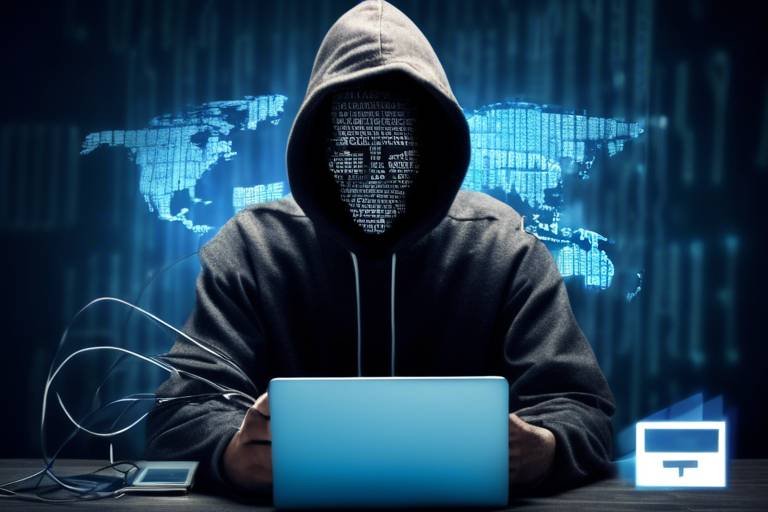Cybersecurity for Personal Computers
In today's digital age, the need for robust cybersecurity measures for personal computers has never been more critical. With the rise of cyber threats lurking around every corner of the internet, it’s essential to arm yourself with the right knowledge and tools to protect your sensitive information. Imagine your personal computer as a fortress; without proper defenses, it’s just a matter of time before cybercriminals breach your walls and wreak havoc. This article explores essential strategies and practices to ensure your digital fortress remains intact, safeguarding your data and maintaining your system's integrity.
To effectively defend against cyber threats, it’s vital to first understand what you’re up against. Cyber threats come in various forms, each designed to exploit vulnerabilities in your computer system. Here’s a brief overview of some of the most common threats:
- Malware: This umbrella term encompasses various malicious software, including viruses, worms, and spyware, all designed to disrupt, damage, or gain unauthorized access to your computer.
- Phishing: A deceptive tactic where cybercriminals impersonate legitimate entities to trick you into revealing sensitive information, such as passwords and credit card numbers.
- Ransomware: A particularly nasty type of malware that encrypts your files and demands a ransom for their release, often leaving victims with no choice but to pay up or lose their data.
Each of these threats poses a significant risk to your personal information and overall computer functionality. Understanding these threats is the first step toward effective protection.
Now that we’ve established the types of cyber threats, let’s talk about one of the most critical defenses against them: antivirus software. Think of antivirus software as your computer's first line of defense, scanning for and neutralizing threats before they can cause any damage. When choosing the right antivirus solution, consider factors such as the software's detection rates, user reviews, and the specific features it offers.
There are several types of antivirus software available, each with its own strengths and weaknesses. Here’s a quick rundown:
| Type | Description | Cost |
|---|---|---|
| Free Antivirus | Basic protection against common threats. | Free |
| Paid Antivirus | Comprehensive protection with additional features like firewalls and VPNs. | $30 - $100/year |
| Internet Security Suites | All-in-one solutions that include antivirus, firewall, and more. | $50 - $150/year |
Choosing the right solution depends on your specific needs and the level of protection you require.
One of the most significant advantages of modern antivirus software is real-time protection. This feature continuously monitors your computer for suspicious activity, blocking threats before they can infiltrate your system. Imagine having a vigilant guard standing at the gates of your fortress, ready to thwart any intruder at a moment's notice. Real-time protection is essential for maintaining a secure computing environment.
Keeping your antivirus software updated is equally crucial. Cyber threats evolve rapidly, and outdated software may not recognize new vulnerabilities. Regular updates ensure that your antivirus can effectively combat the latest threats and vulnerabilities. Think of it as regularly reinforcing your fortress walls with stronger materials to withstand modern siege tactics.
In addition to antivirus software, adopting essential cybersecurity practices can significantly enhance your personal computer's security. Here are some key practices to consider:
- Use Strong Passwords: Create complex passwords that are difficult to guess and change them regularly.
- Regular Backups: Backup your data frequently to ensure you can recover it in case of a cyber attack.
Implementing these practices can provide an additional layer of security, making it harder for cybercriminals to breach your defenses.
While antivirus software and cybersecurity practices are vital, your browsing habits also play a significant role in your overall security. To minimize the risk of cyber attacks, consider the following tips:
- Recognize Secure Websites: Look for HTTPS in the URL, indicating a secure connection.
- Avoid Suspicious Links: Be cautious of clicking on links in emails or messages from unknown sources.
By cultivating safe browsing habits, you can reduce the likelihood of falling victim to cyber threats.
Phishing is one of the most common tactics used by cybercriminals. To spot phishing attempts, look for signs such as poor grammar, generic greetings, and suspicious URLs. If something seems off, trust your instincts and don’t click on any links or provide personal information.
A Virtual Private Network (VPN) is another tool that can enhance your online security, especially when using public Wi-Fi networks. A VPN encrypts your internet connection, making it much harder for cybercriminals to intercept your data. Think of it as a secure tunnel that shields your information from prying eyes.
Finally, let’s discuss the importance of regular data backups. In the unfortunate event of a cyber attack, having a recent backup can save you from losing valuable information. Consider using cloud storage solutions or external hard drives to securely back up your data. Regular backups are like having a safety net; they ensure that even if you fall, you won’t hit the ground hard.
1. How often should I update my antivirus software?
It’s best to enable automatic updates so you always have the latest protection against new threats.
2. Can I use free antivirus software?
Yes, free antivirus software can provide basic protection, but consider upgrading to a paid option for more comprehensive security.
3. What should I do if I suspect a phishing attempt?
Do not click any links or provide information. Report the email or message and delete it immediately.
4. How often should I back up my data?
Regular backups should be done at least once a month, but if you frequently create or modify important files, consider weekly backups.

Understanding Cyber Threats
This article explores essential strategies and practices to protect personal computers from cyber threats, ensuring the safety of sensitive information and maintaining system integrity.
In today's digital age, understanding cyber threats is crucial for anyone who uses a personal computer. Cyber threats are malicious acts intended to damage, steal, or disrupt your data and systems. These threats can come in various forms, each with its own unique methods of attack and potential consequences. Let's break down some of the most common types of cyber threats that could be lurking around the corner.
Malware is perhaps the most infamous of cyber threats. This term encompasses a range of harmful software, including viruses, worms, and trojans. Once installed on your system, malware can wreak havoc by corrupting files, stealing sensitive information, or even taking control of your computer. Imagine your computer as a fortress; malware is like a sneaky intruder who finds a way in and starts rummaging through your valuables.
Next up is phishing, a technique used by cybercriminals to deceive users into revealing personal information, such as passwords or credit card numbers. Phishing often comes in the form of emails or messages that appear to be from legitimate sources. For instance, you might receive an email that looks like it's from your bank, urging you to click on a link to verify your account. If you fall for it, it's like handing over the keys to your castle without realizing it!
Then there's ransomware, a particularly nasty type of malware that locks your files and demands payment for their release. Imagine waking up one day to find all your important documents encrypted, with a message on your screen demanding money to get them back. Ransomware attacks can be devastating, especially for individuals and small businesses that may not have adequate backups.
To give you a clearer picture, here's a quick overview of these threats:
| Type of Threat | Description | Potential Impact |
|---|---|---|
| Malware | Harmful software designed to damage or disrupt systems | Data loss, unauthorized access, system failure |
| Phishing | Fraudulent attempts to obtain sensitive information | Identity theft, financial loss |
| Ransomware | Malware that encrypts files and demands payment for access | Loss of access to critical data, financial loss |
These threats not only compromise your personal data but can also lead to significant financial losses and emotional distress. Understanding these dangers is the first step in safeguarding your personal computer. It's essential to stay informed about the evolving landscape of cyber threats, as new attacks emerge regularly, often exploiting the latest vulnerabilities in software and human behavior.
So, how can you protect yourself? The answer lies in being proactive. By adopting a combination of effective security measures, such as using reliable antivirus software, practicing safe browsing habits, and staying vigilant against phishing attempts, you can fortify your defenses against these cyber threats. Remember, in the digital world, knowledge is your best weapon!
- What is the most common type of cyber threat? Malware is one of the most prevalent threats, encompassing various harmful software types.
- How can I identify phishing emails? Look for suspicious sender addresses, generic greetings, and urgent requests for personal information.
- What should I do if I fall victim to ransomware? Disconnect your computer from the internet, report the incident, and consider seeking professional help.

Importance of Antivirus Software
This article explores essential strategies and practices to protect personal computers from cyber threats, ensuring the safety of sensitive information and maintaining system integrity.
An overview of the various types of cyber threats that target personal computers, including malware, phishing, and ransomware, and their potential impact on users.
In today's digital landscape, the cannot be overstated. Imagine your personal computer as a fortress, guarding your most valuable treasures—your data, your identity, and your privacy. Just like a fortress needs a strong wall to fend off invaders, your computer needs robust antivirus software to protect it from cyber threats. Cybercriminals are constantly devising new ways to breach your defenses, and without the right protective measures in place, you could be leaving your digital doors wide open.
Antivirus software acts as the first line of defense against a multitude of cyber threats, including viruses, spyware, adware, and more. These malicious programs can wreak havoc on your system, leading to data loss, identity theft, or even financial ruin. By choosing to install antivirus software, you’re not just investing in a piece of software; you’re investing in peace of mind. But how do you choose the right antivirus solution for your needs?
When selecting antivirus software, consider the following factors:
- Compatibility: Ensure the software is compatible with your operating system.
- Features: Look for features like real-time scanning, automatic updates, and a user-friendly interface.
- Cost: Evaluate whether a free version meets your needs or if a paid version offers better protection.
The effectiveness of antivirus software lies not only in its ability to detect and remove existing threats but also in its capacity to prevent future attacks. This is where real-time protection comes into play. With real-time protection, the antivirus software continuously monitors your system for suspicious activity, blocking threats before they can cause harm. It's like having a security guard on duty 24/7, ensuring that no unwanted guests can enter your digital space.
Another critical aspect is the need for regular updates. Cyber threats are evolving at an alarming rate, and what was considered safe yesterday may not be safe today. Antivirus software providers regularly release updates to address newly discovered vulnerabilities and threats. By keeping your software updated, you ensure that your defenses are always fortified against the latest cyber attacks. Think of it as regularly reinforcing your fortress walls to withstand new siege tactics.
In summary, antivirus software is an essential component of your cybersecurity strategy. It not only protects your personal computer from a wide range of threats but also provides you with the confidence to navigate the digital world safely. By investing in a reliable antivirus solution and maintaining it with regular updates, you can significantly reduce your risk of falling victim to cybercrime.
Q: Do I really need antivirus software if I practice safe browsing?
A: While safe browsing habits are crucial, antivirus software adds an additional layer of protection that can catch threats you might miss.
Q: Can free antivirus software provide adequate protection?
A: Free antivirus software can offer basic protection, but paid versions often include advanced features and better customer support.
Q: How often should I update my antivirus software?
A: You should enable automatic updates to ensure your antivirus software stays current with the latest threat definitions.
Q: What should I do if my antivirus software detects a threat?
A: Follow the software's instructions to quarantine or remove the threat, and consider running a full system scan to ensure your computer is clean.

Types of Antivirus Solutions
When it comes to protecting your personal computer from cyber threats, choosing the right antivirus solution is crucial. With a myriad of options available, it can feel overwhelming to navigate through them all. However, understanding the different types of antivirus solutions can simplify your decision-making process. Generally, antivirus software can be categorized into three main types: free antivirus, paid antivirus, and enterprise-level solutions. Each type has its own unique features and benefits, making it essential to assess your specific needs before making a choice.
Free antivirus solutions are often a popular starting point for many users. They provide basic protection against common threats like viruses and malware without costing a dime. However, while they can be effective for light users, they typically come with limitations, such as fewer features and less frequent updates. Users may find these solutions lacking in advanced protection against more sophisticated threats like ransomware or phishing attacks. It's like having a security guard who only works part-time; they're there, but not always when you need them the most.
On the other hand, paid antivirus solutions offer a more comprehensive approach to cybersecurity. These programs often include a suite of features such as real-time protection, firewall capabilities, and advanced malware detection. Investing in a paid solution is like hiring a full-time security team for your home; they monitor everything around the clock, ensuring that you are protected against a wider range of threats. Many paid options also come with customer support, giving you peace of mind that help is available if you encounter any issues.
For businesses and organizations, enterprise-level antivirus solutions are designed to protect multiple devices across a network. These solutions offer centralized management, allowing IT teams to implement security measures and updates efficiently. They often include advanced features such as intrusion detection systems and data loss prevention, making them ideal for safeguarding sensitive information. Think of enterprise-level solutions as a fortress; they not only protect individual users but also create a secure environment for all data within the organization.
When choosing an antivirus solution, consider factors such as your usage patterns, the sensitivity of your data, and your budget. A comparison table can be helpful in evaluating the options available:
| Type of Antivirus | Features | Best For |
|---|---|---|
| Free Antivirus | Basic protection, limited features | Casual users |
| Paid Antivirus | Comprehensive protection, real-time updates, customer support | Regular users, families |
| Enterprise-Level Solutions | Centralized management, advanced security features | Businesses and organizations |
Ultimately, the choice of antivirus solution should align with your personal or organizational needs. Remember, the digital landscape is constantly evolving, and so are the threats that come with it. Regularly reassessing your antivirus needs will help ensure that you stay one step ahead of cybercriminals.

Real-time Protection
This article explores essential strategies and practices to protect personal computers from cyber threats, ensuring the safety of sensitive information and maintaining system integrity.
An overview of the various types of cyber threats that target personal computers, including malware, phishing, and ransomware, and their potential impact on users.
Discussing the role of antivirus software in protecting personal computers from malicious attacks and how to choose the right solution for your needs.
Exploring different types of antivirus software available, including free and paid options, and their effectiveness in combating various cyber threats.
In today's digital landscape, is a crucial feature of any antivirus software. Imagine having a security guard who is always on duty, ready to intercept any potential threats before they can cause harm to your personal computer. This is essentially what real-time protection does—it actively monitors your system for suspicious activities and malware, ensuring that your sensitive information remains safe.
Real-time protection works by constantly scanning files as they are opened, downloaded, or executed. If the software detects anything that resembles a threat, it immediately alerts you and takes action, either by quarantining the file or blocking it altogether. This proactive approach is essential because many cyber threats can infiltrate your system before you even realize it. Without real-time protection, you might find yourself at the mercy of a ransomware attack or a data breach.
To illustrate the importance of real-time protection, consider the following scenarios:
- Scenario 1: You're downloading a seemingly harmless file from the internet. Without real-time protection, this file could contain hidden malware that activates once downloaded.
- Scenario 2: You receive an email attachment that appears legitimate. Real-time protection can analyze the attachment in real-time, flagging it as malicious before you open it.
Moreover, the effectiveness of real-time protection can vary significantly among different antivirus solutions. Some programs offer advanced machine learning algorithms that can detect even the most sophisticated threats, while others may rely on outdated signatures that fail to catch new malware. Therefore, it’s essential to choose an antivirus solution that prioritizes real-time protection and regularly updates its threat database.
In summary, real-time protection is like having a vigilant watchdog for your personal computer. It not only prevents potential threats from entering your system but also gives you peace of mind while you navigate the digital world. When selecting antivirus software, ensure that it includes robust real-time protection features to safeguard your sensitive data effectively.
Highlighting essential cybersecurity practices that users should adopt to enhance their personal computer security, such as strong passwords and regular backups.
Providing tips for maintaining safe browsing habits, including recognizing secure websites and avoiding suspicious links to minimize the risk of cyber attacks.
Guiding users on how to spot phishing emails and messages, which are common tactics used by cybercriminals to steal personal information.
Explaining the benefits of using a Virtual Private Network (VPN) for secure internet browsing, especially when accessing public Wi-Fi networks.
Discussing the importance of regular data backups to prevent loss in the event of a cyber attack and the best methods for backing up data securely.
1. What is real-time protection?
Real-time protection is a feature in antivirus software that continuously monitors your computer for threats, blocking them before they can cause harm.
2. Why is real-time protection important?
It is important because it helps prevent malware and other cyber threats from infiltrating your system, ensuring your data remains secure.
3. How often should I update my antivirus software?
You should update your antivirus software regularly, ideally set to automatic updates, to ensure it can effectively combat the latest threats.
4. Can I rely on free antivirus solutions?
While free antivirus solutions can provide some level of protection, they often lack comprehensive features like real-time protection and may not be as effective against advanced threats.

Regular Updates
When it comes to cybersecurity, one of the most crucial aspects that often gets overlooked is the **importance of regular updates**. Think of your computer as a fortress. A fortress needs to be reinforced and maintained to withstand attacks, right? Well, your personal computer is no different. Software developers are constantly working to patch vulnerabilities and improve their products. By keeping your software updated, you're essentially sealing the cracks in your fortress, making it harder for cybercriminals to breach your defenses.
Many users tend to ignore update notifications, thinking they can postpone them until later. However, this can be a dangerous game. Cyber threats are evolving at an alarming rate, and new vulnerabilities are discovered daily. A software update might seem trivial, but it often contains critical security patches that protect you from the latest threats. For example, an update for your operating system might fix a flaw that hackers have been exploiting to gain unauthorized access to users' data. Ignoring these updates is like leaving the door to your fortress wide open!
Moreover, regular updates extend beyond just your operating system. It’s essential to keep all your applications up-to-date as well. This includes your web browsers, antivirus software, and any other programs you use regularly. Each of these pieces of software can have vulnerabilities that need to be addressed. Failing to update them can leave you exposed to malware, ransomware, and other cyber threats. To illustrate this, consider the following table that outlines the potential risks of outdated software versus the benefits of keeping everything updated:
| Outdated Software Risks | Benefits of Regular Updates |
|---|---|
| Increased vulnerability to attacks | Enhanced security features |
| Higher chances of data breaches | Protection against new threats |
| Compatibility issues with new applications | Improved performance and stability |
| Loss of support from developers | Access to new features and improvements |
To make regular updates a part of your routine, consider enabling automatic updates wherever possible. This way, you won’t have to worry about manually checking for updates or forgetting to install them. Just like setting your alarm clock for an early morning wake-up call, automatic updates ensure your system is always protected without requiring constant attention. However, keep in mind that some updates may require a restart of your system, so it’s wise to schedule these updates during times when you’re not heavily using your computer.
In conclusion, regular updates are not just a minor inconvenience; they are a **vital part of your cybersecurity strategy**. By keeping your software up-to-date, you are actively defending your personal computer against potential cyber threats. So, the next time you see that update notification pop up, don’t hit the snooze button—take action and fortify your digital fortress!
- Why are regular updates important for my computer? Regular updates patch vulnerabilities, improve security, and enhance performance, protecting you from cyber threats.
- How often should I update my software? You should check for updates regularly and enable automatic updates whenever possible to ensure you're always protected.
- What happens if I ignore software updates? Ignoring updates can leave your system vulnerable to attacks, increasing the risk of data breaches and malware infections.
- Can I schedule updates to avoid interruptions? Yes, most operating systems allow you to schedule updates during times when you're not actively using your computer.

Common Cybersecurity Practices
When it comes to keeping your personal computer safe from cyber threats, adopting is essential. Think of your computer as a house; if you leave the doors and windows unlocked, you’re inviting trouble right in! So, how can you fortify your digital home? It all starts with implementing a few simple yet effective strategies that can significantly enhance your security.
One of the first steps you should take is to create strong passwords. A password is like the key to your house; if it’s weak, anyone can get in. Aim for a combination of uppercase letters, lowercase letters, numbers, and special characters. Avoid using easily guessed information like your birthday or pet's name. Instead, consider using a password manager to help you generate and store complex passwords securely. This way, you won’t have to remember every single one!
Another crucial practice is to enable two-factor authentication (2FA) wherever possible. This adds an extra layer of security by requiring not just your password but also a second piece of information, like a code sent to your phone. It’s like having a second lock on your door; even if someone gets your key, they still can’t enter without that second lock!
Regularly updating your software is another key practice. Software updates often include security patches that fix vulnerabilities that hackers could exploit. Just like you wouldn’t ignore a leaky roof, don’t ignore those update notifications. Set your software to update automatically if you can, or make it a habit to check for updates weekly.
Additionally, consider backing up your data regularly. This is your safety net in case of a cyber attack or hardware failure. You wouldn’t want to lose all your precious photos and important documents, right? Use external hard drives or cloud storage solutions to keep your data safe. Remember, having a backup is like having insurance; it might seem unnecessary until you need it!
Lastly, be mindful of your online behavior. Avoid clicking on suspicious links or downloading attachments from unknown sources. Cybercriminals often rely on unsuspecting users to fall for their traps. Think of it as a game of trust; only engage with websites and emails that you know are safe. If something seems off, it probably is!
In summary, implementing these can drastically reduce your risk of falling victim to cyber threats. By creating strong passwords, enabling two-factor authentication, keeping your software updated, backing up your data, and being cautious online, you can create a robust defense against potential attacks. Remember, in the world of cybersecurity, it’s better to be safe than sorry!
1. What are the best practices for creating strong passwords?
To create strong passwords, use a mix of uppercase and lowercase letters, numbers, and special characters. Avoid using personal information and consider using a password manager to help you generate and store them securely.
2. How often should I update my software?
You should check for software updates at least once a week. Setting your software to update automatically is even better, as it ensures you’re protected against the latest vulnerabilities.
3. What is two-factor authentication and why is it important?
Two-factor authentication (2FA) adds an extra layer of security by requiring two forms of identification before granting access. This makes it significantly harder for unauthorized users to access your accounts, even if they have your password.
4. How can I safely back up my data?
You can back up your data using external hard drives or cloud storage services. Regularly schedule backups to ensure your most important files are always safe and accessible.
5. What should I do if I receive a suspicious email?
If you receive a suspicious email, do not click on any links or download attachments. Instead, verify the sender's email address and look for signs of phishing. If it seems fraudulent, report it to your email provider.

Safe Browsing Habits
In today's digital age, where the internet is an integral part of our daily lives, practicing is more crucial than ever. Just like you wouldn’t walk through a dark alley alone at night, you shouldn’t navigate the web without taking necessary precautions. The internet can be a vast ocean filled with both treasures and dangers, and knowing how to swim safely is essential. So, how can you ensure that your online experience is as secure as possible?
First and foremost, always look for secure websites when entering personal information. A secure site will typically have a URL that begins with https:// rather than just http://. The extra 's' stands for 'secure', indicating that the site uses encryption to protect your data. To put it simply, think of it as a lock on the door—without it, you’re leaving your valuables exposed to anyone who might want to take a peek inside.
Another vital aspect of safe browsing is being cautious with links. Cybercriminals often use malicious links to lure unsuspecting users into giving up sensitive information or downloading harmful software. If you receive an email or message that contains a link, especially from someone you don’t know, take a moment to scrutinize it. Hover over the link to see the actual URL before clicking. If it looks suspicious or doesn't match the context of the message, it’s better to err on the side of caution and avoid it.
Moreover, using a password manager can significantly enhance your security while browsing. These tools help you generate and store complex passwords, so you don’t have to rely on memory alone. Think of a password manager as your personal vault—it keeps your most valuable secrets safe and sound. Additionally, consider enabling two-factor authentication wherever possible. This adds an extra layer of protection by requiring not just your password but also a second form of verification, such as a code sent to your phone.
While we’re on the topic of protection, let’s not forget about the importance of keeping your software updated. Whether it’s your operating system, web browser, or any installed applications, updates often contain patches for security vulnerabilities. Ignoring these updates is like leaving the windows of your house wide open—you're just inviting trouble. So, make it a habit to check for updates regularly; your future self will thank you!
Finally, consider using a Virtual Private Network (VPN) when browsing, especially on public Wi-Fi networks. Public Wi-Fi can be a hacker's playground, and a VPN acts as a secure tunnel for your data, making it much harder for cybercriminals to intercept your information. Think of a VPN as a secret pathway that keeps your online activities hidden from prying eyes.
In summary, practicing safe browsing habits is not just about being cautious; it’s about being proactive. By following these guidelines, you can significantly reduce the risk of falling victim to cyber threats. Remember, the internet is a wonderful tool, but it’s essential to navigate it wisely. Your personal information is valuable—treat it that way!
- What should I do if I accidentally click on a suspicious link?
Immediately close the browser tab, run a virus scan, and change your passwords as a precaution. - Are free VPNs safe to use?
While some free VPNs can offer basic protection, many come with limitations and may not guarantee your privacy. It's often better to invest in a reputable paid service. - How can I tell if a website is legitimate?
Look for user reviews, check the URL for 'https', and be wary of sites that ask for excessive personal information.

Identifying Phishing Attempts
Phishing attempts are like the digital equivalent of a wolf in sheep's clothing. Cybercriminals craft emails and messages that appear legitimate, often mimicking trusted organizations or contacts to trick unsuspecting users into revealing sensitive information. So, how can you spot these deceitful tactics before it's too late? Here are some key indicators to watch out for:
First and foremost, look closely at the sender's email address. While the display name might seem familiar, the actual email address often contains subtle misspellings or unusual domains. For example, an email from "support@bank.com" might actually be from "support@bank-secure.com." Always double-check the sender's address to ensure its authenticity.
Next, pay attention to the language used in the message. Phishing emails often contain urgent calls to action, such as "Your account will be suspended!" or "Immediate verification needed!" These messages are designed to create a sense of panic, prompting you to act quickly without thinking. Legitimate organizations typically communicate in a more professional tone and would never demand immediate action in such a manner.
Another red flag is poor grammar and spelling mistakes. Many phishing attempts originate from non-native English speakers, leading to awkward phrasing or misspelled words. If the email sounds off or contains grammatical errors, it's a strong indication that it's not from a reputable source.
Additionally, be wary of links and attachments. Phishing emails often include links that lead to fake websites designed to capture your login credentials. Hover over any link before clicking it to see the actual URL. If it looks suspicious or doesn’t match the company’s official website, don’t click! Similarly, avoid downloading attachments from unknown senders, as they may contain malware.
To further protect yourself, consider using a spam filter and keeping your email security settings high. Most email providers offer options to filter out suspicious messages before they even reach your inbox. This simple step can drastically reduce your chances of falling victim to phishing scams.
In conclusion, being vigilant and informed is your best defense against phishing attempts. By recognizing the signs and maintaining a healthy skepticism towards unsolicited communications, you can safeguard your personal information and avoid potential cyber threats. Remember, if something feels off, it's always better to err on the side of caution and verify before you click.
- What should I do if I suspect a phishing attempt? If you believe you have received a phishing email, do not engage with it. Report it to your email provider and delete it immediately.
- Can phishing attempts occur via text messages? Yes, phishing can occur through SMS (often referred to as "smishing") where attackers send fraudulent text messages to trick you into providing personal information.
- Is it safe to click links in emails from known contacts? Even if an email appears to be from someone you know, verify with them directly before clicking any links, as their account may have been compromised.

Using a VPN
In today's digital landscape, where our lives are increasingly intertwined with the internet, the need for privacy and security has never been more paramount. One effective way to bolster your online safety is by using a Virtual Private Network (VPN). But what exactly is a VPN, and how can it protect you? Imagine a VPN as a secure tunnel that shields your data from prying eyes while you navigate the vast expanse of the internet. It reroutes your internet connection through a server, encrypting your data and masking your IP address, making it significantly harder for hackers and cybercriminals to track your online activities.
When you connect to a VPN, your internet traffic is encrypted, which means that even if someone were to intercept your data, they would only see gibberish. This is especially crucial when using public Wi-Fi networks, which can be hotbeds for cyber threats. Have you ever connected to a coffee shop's free Wi-Fi? While it might seem convenient, it can also expose you to risks. With a VPN, you can browse the internet securely, even on these unsecured networks, as it shields your sensitive information like passwords and credit card numbers from potential thieves.
Moreover, a VPN can help you access content that may be restricted in your region. For instance, if you're traveling and want to watch your favorite shows that are only available in your home country, a VPN allows you to connect to a server in that country, making it appear as though you are browsing from there. This not only enhances your online experience but also ensures that you can enjoy your favorite content without geographical limitations.
However, it's essential to choose the right VPN service. Not all VPNs are created equal. Some may offer robust encryption and a wide range of server locations, while others might compromise your privacy by logging your data. Here are a few key features to look for when selecting a VPN:
- Strong Encryption: Look for VPNs that offer AES-256 encryption, which is considered industry standard.
- No-Log Policy: Choose a VPN that does not keep logs of your online activity to ensure your privacy is maintained.
- Speed and Performance: A good VPN should provide fast connection speeds without significant lag.
- Multi-Device Support: Ensure the VPN can be used on various devices, including smartphones, tablets, and computers.
In conclusion, using a VPN is an essential step in safeguarding your online presence. It not only protects your data from cyber threats but also enhances your internet experience by allowing you to access content freely. As we continue to navigate a world where online privacy is increasingly at risk, investing in a reliable VPN service could be one of the best decisions you make for your personal cybersecurity.
Q: What is a VPN?
A: A VPN, or Virtual Private Network, is a service that encrypts your internet connection and masks your IP address, providing you with enhanced privacy and security online.
Q: Is using a VPN legal?
A: Yes, using a VPN is legal in most countries. However, some countries have restrictions on VPN usage, so it's important to check local laws.
Q: Can a VPN slow down my internet speed?
A: Some VPNs may slightly reduce your internet speed due to the encryption process. However, many premium VPN services are designed to maintain fast speeds.
Q: Can I use a VPN on my smartphone?
A: Yes! Most VPN services offer mobile applications that allow you to use a VPN on your smartphone or tablet.

Backing Up Data
In the digital age, where our personal and professional lives are intertwined with technology, has become a necessity rather than a luxury. Imagine losing all your precious photos, important documents, or even your favorite playlists due to a sudden cyber attack or hardware failure. It’s like losing a piece of your life! Regular data backups act as a safety net, ensuring that even if disaster strikes, you can recover your information without a hitch.
So, how do you go about backing up your data securely? First off, it's essential to choose the right method that suits your needs. There are several options available, each with its own advantages and disadvantages:
| Backup Method | Description | Pros | Cons |
|---|---|---|---|
| External Hard Drive | A physical device that connects to your computer to store data. | High storage capacity, quick access. | Can be lost or damaged. |
| Cloud Storage | Online services that store your data on remote servers. | Accessible from anywhere, automatic backups. | Requires internet, potential privacy concerns. |
| Network Attached Storage (NAS) | A dedicated device connected to your network for data storage. | Centralized storage for multiple devices. | Can be expensive and complex to set up. |
Choosing between these methods can feel overwhelming, but understanding your needs is crucial. If you have a lot of data and prefer quick access, an external hard drive might be your best bet. On the other hand, if you travel frequently or work from multiple locations, cloud storage could provide the flexibility you need.
It's not just about choosing a backup method; it's also about establishing a regular backup schedule. Think of it like going to the dentist—nobody enjoys it, but it’s essential for your long-term health. Set a reminder to back up your data weekly or monthly, depending on how often you generate new files. This way, you can ensure that your most recent work is always protected.
Moreover, don’t forget to test your backups. It’s one thing to have your data stored away, but it’s another to know that you can actually retrieve it when needed. Regularly check your backups to ensure they’re functioning correctly. After all, what good is a backup if it doesn’t work when you need it?
In conclusion, backing up your data is a fundamental aspect of maintaining your personal computer's integrity and security. By utilizing the right methods and keeping to a consistent schedule, you can safeguard your invaluable information against the unpredictable nature of technology.
- How often should I back up my data? Ideally, you should back up your data at least once a week, but daily backups may be necessary if you frequently update important files.
- Is cloud storage safe? Cloud storage can be safe, but it’s crucial to choose reputable providers and use encryption to protect sensitive information.
- What should I do if I lose my data? If you lose your data, first check your backup solutions. If you can't recover it, consider professional data recovery services, although they can be expensive.
Frequently Asked Questions
-
What are the most common cyber threats targeting personal computers?
The most common cyber threats include malware, which can infect your system and cause damage; phishing, where attackers trick you into revealing personal information; and ransomware, which locks you out of your files until a ransom is paid. Understanding these threats is crucial for protecting your sensitive information.
-
How does antivirus software protect my computer?
Antivirus software acts like a digital bodyguard for your computer. It scans for malicious software, monitors your system in real-time, and removes threats before they can do any harm. Choosing the right antivirus solution can make a significant difference in your overall cybersecurity.
-
Are free antivirus solutions effective?
Free antivirus solutions can provide basic protection, but they often lack advanced features and real-time protection that paid options offer. It's essential to evaluate your needs and consider investing in a comprehensive antivirus solution for better security.
-
What is real-time protection in antivirus software?
Real-time protection is a feature that actively scans your computer for threats as they occur, rather than relying solely on scheduled scans. This proactive approach helps to catch and neutralize threats before they can infiltrate your system, keeping your data safer.
-
Why is it important to regularly update antivirus software?
Regular updates are crucial because new cyber threats emerge constantly. Keeping your antivirus software updated ensures that it can recognize and defend against the latest vulnerabilities and malware types, providing you with the best protection possible.
-
What are some essential cybersecurity practices I should adopt?
Adopting strong cybersecurity practices is vital for protecting your personal computer. This includes using strong passwords, enabling two-factor authentication, regularly backing up your data, and being cautious about the links you click and the websites you visit.
-
How can I identify phishing attempts?
To identify phishing attempts, look for signs like poor grammar, unusual sender addresses, and urgent requests for personal information. Always double-check the URL of links before clicking and consider contacting the sender through a trusted method if you're unsure.
-
What are the benefits of using a VPN?
A VPN, or Virtual Private Network, encrypts your internet connection, making it much harder for hackers to intercept your data. It's especially useful when using public Wi-Fi networks, as it helps protect your personal information from cybercriminals lurking in the shadows.
-
How often should I back up my data?
It's recommended to back up your data at least once a week, but more frequent backups are ideal, especially if you regularly create or modify important files. This way, you can quickly recover your data in case of a cyber attack or hardware failure.



















